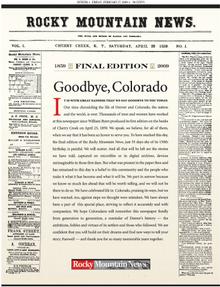 When Rupert Murdoch proposed charging for access to News International websites, there were predictions that a stampede of other titles would join in.
When Rupert Murdoch proposed charging for access to News International websites, there were predictions that a stampede of other titles would join in. Obviously the smart thing to do for anyone considering taking this approach is to see what it does to Rupert's bottom line, but many are going beyond waiting and seeing.
The Telegraph, for instance, have described it as "a gift to the competition", and if you can think of a more direct competitor to the Times than the Telegraph, do tell.
The Guardian's heading in the opposite direction: they just took down the last paywall, although that was only around the crossword. A members' club, something they are considering, is not the same beast. The question is this: can you read the paper online or not?
There are somewhat more plausible moves to charge afoot in the States, but the bottom line remains that it'd be a cartel, and there'll be more opportunities in undermining a cartel than there are in taking part.
Imagine all the UK broadsheets join a paywall conglomerate apart from the Guardian or the Telegraph. Which paper will you read online? Which familiar commentators will you choose when you're buying a paper copy for the train? Who gets blogged about? Which proprietor has influence, which remember is what most people own newspapers for?
If you really want to know what's happening, the best guide is the Kübler-Ross model, which set out the five stages of grief. I shall lazily point you to the Wikipedia page. Here are the stages, as they apply to the newspaper industry:
1. Denial - "This can't be happening, not to me, I have a three-hundred-year-old business model." (c. 2002 - 2004)
2. Anger - "Who is to blame? Is it Craiglist or those pesky bloggers?" (c. 2005 to 2009)
3. Bargaining - "I'll try paywalls again if it gives me a few more years." (right now)
4. Depression - "This industry's going to die. What's the point?" (when the Murdoch experiment fails, probably within a year from when it's brought in)
5. Acceptance - "I can't fight it, I may as well prepare for it."
I'm not sure what the model is for the last phase, and I desperately hope it still includes as much good journalism and commentary as possible. But I'm convinced that Clay Shirky's more likely right about this than Tom Harris or the more thoughtful Doctor Vee.
Previously here:
No news is bad news (April 09)
No more buggy whips (March 09)





The newspapers are, as ever, missing a trick.
5 minutes before reading this, I was sitting scrolling through the Android Market (Google's app store for Android-powered phones) when I noticed that some cheeky bugger is charging 90p for an app that presents all the news feeds from The Times. The same developer has paid apps for The Sun, The Independent, "UK Political News", Live UK Train Times and the BBC, amongst others. It's all the same information you can get by visiting their mobile websites. In fact, it wouldn't surprise me to find that the app merely takes you to their mobile websites.
There is nothing to stop the newspapers developing their own apps or widgets which would present their content backed up by advertising, and charging micro-rates. Someone who baulks at paying £1 a day for a newspaper might be happy to shell out 50p a week instead, and with the number of app-running smartphones increasing all the time this could be a rich source of revenue. Amazon's wi-fi enabled Kindle, as well, could do wonders for a newspaper.
If you install a paywall you stop people linking to you. If people stop linking to you, then your voice is removed from the debate and you become irrelevant. I can't imagine the News International boardroom thinks at the cutting edge, but they're taking a step back from what they were even ten years ago.